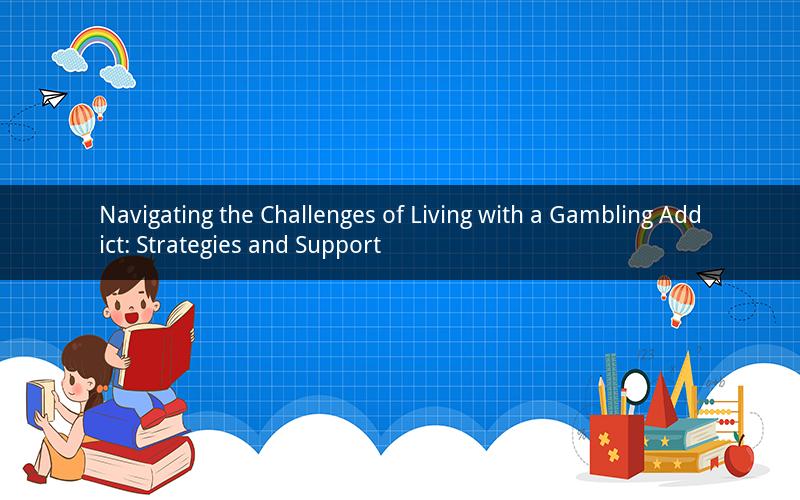
Living with a gambling addict can be a challenging and emotional experience. Whether you are a family member, friend, or partner, it is crucial to understand the complexities of this addiction and how to effectively cope with its impact on your life. In this article, we will explore various strategies and support systems available to help you navigate the challenges of living with a gambling addict.
Understanding the Addiction
To effectively support a gambling addict, it is essential to have a clear understanding of the addiction itself. Gambling addiction is a progressive and chronic condition characterized by an inability to control or stop gambling despite the negative consequences. Here are some key aspects of gambling addiction to consider:
1. The Cycle of Addiction: A gambling addict often experiences a cycle of bingeing, followed by a period of guilt and remorse, and then a return to gambling. This cycle can be difficult to break, and understanding it can help you identify patterns in the addict's behavior.
2. The Impact on Relationships: Gambling addiction can have a significant impact on relationships, leading to financial strain, emotional turmoil, and even legal issues. It is important to recognize the signs of stress and conflict in your relationship and seek help when necessary.
3. Support Systems: Finding a strong support system is crucial for both the gambling addict and their loved ones. Support can come from family, friends, professionals, and support groups dedicated to helping individuals affected by gambling addiction.
Strategies for Coping
Living with a gambling addict requires patience, resilience, and a willingness to adapt. Here are some strategies to help you cope with the challenges of this situation:
1. Educate Yourself: Learn about gambling addiction, its signs, and the potential consequences. This knowledge can help you recognize when the addict's behavior is escalating and enable you to offer appropriate support.
2. Communicate Openly: Establish open and honest communication with the gambling addict. Encourage them to seek help and express your concerns without placing blame. Remember that the addiction is not a personal attack on you or your relationship.
3. Set Boundaries: Establish clear boundaries to protect yourself and your loved ones from the negative consequences of the addiction. This may include limiting contact with the addict during vulnerable times or setting financial boundaries to prevent them from accessing gambling resources.
4. Create a Support Network: Surround yourself with people who understand your situation and can offer support. This may include family, friends, support groups, or professionals who specialize in gambling addiction.
5. Focus on Self-Care: Take care of your own mental and physical health while supporting the addict. Engage in activities that promote your well-being, seek professional help if needed, and maintain a healthy lifestyle.
Support Systems for Gambling Addicts
Support systems are crucial for both the gambling addict and their loved ones. Here are some resources and support systems available:
1. Professional Help: Seek the guidance of a mental health professional who specializes in gambling addiction. Therapy can help the addict understand their addiction and develop strategies to overcome it.
2. Support Groups: Join a support group for individuals affected by gambling addiction. These groups provide a safe space to share experiences, receive guidance, and offer mutual support.
3. Financial Counseling: Consider seeking financial counseling to help manage the financial consequences of the addiction. A financial counselor can help you create a budget, negotiate with creditors, and develop a plan to recover from the debt.
4. Legal Assistance: If the addiction has led to legal issues, such as fraud or embezzlement, consider seeking legal assistance to navigate the legal process and protect your interests.
5. Relapse Prevention: Learn about relapse prevention strategies to help the addict stay on track. This may involve identifying triggers and developing coping mechanisms to deal with stress and temptation.
Frequently Asked Questions
1. How can I tell if someone is a gambling addict?
A gambling addict often exhibits signs such as hiding their behavior, lying about their gambling habits, losing significant amounts of money, and experiencing emotional and financial turmoil as a result of gambling.
2. Should I confront the gambling addict about their behavior?
Yes, confronting the addict about their behavior is important. However, it is crucial to approach the conversation with empathy and without placing blame. Encourage them to seek help rather than accusing them of wrongdoing.
3. How can I help my loved one recover from gambling addiction?
Support your loved one by encouraging them to seek professional help, providing a safe and supportive environment, and helping them develop coping strategies to deal with triggers and stress.
4. Can a gambling addiction be cured?
While there is no cure for gambling addiction, it can be managed and overcome with proper treatment and support. Recovery is a long-term process that requires dedication and commitment.
5. How can I protect myself from the negative consequences of a gambling addict's behavior?
Establish clear boundaries, seek support from others, and prioritize your own well-being. Consider seeking professional help to develop strategies for coping with the challenges of living with a gambling addict.